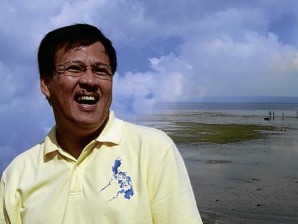Masbate seaside boulevard to be renamed after Robredo

Councilor Alberto Abayon said that on Tuesday the Sangguniang Panlungsod would pass an ordinance renaming the coastal road after Robredo.
The road, which cuts across Barangays Ibingay, Nursery, Espinosa and Bagumbayan, will be the first to be named after Robredo following the death of the popular home affairs chief.
In Roxas City, capital of Capiz province, Governor Victor Tanco Sr. said Saturday that the new building of the Department of the Interior and Local Government will also be named after Robredo.
Tanco said the provincial board would pass a resolution for the naming of the building after Robredo.
The four-story building stands on a 444-square-meter property owned by the provincial government in Barangay Tiza, Roxas City. It cost P7.3 million. Robredo led the building’s inauguration in April.
Article continues after this advertisement“We [in the local governments] have lost a champion of good governance and an advocate of transparency, accountability and people’s participation,” Tanco said.
Article continues after this advertisementRobredo will be buried with full honors in his hometown in Naga City, Camarines Sur province, on Tuesday.
Abayon said the Masbate City government would also build a bust of Robredo on the boulevard at Ibingay to preserve the memory of a “hero” and a “kind-hearted and dedicated official.”
“It would be a tribute to an idol of good governance,” Tuason said.
Councilor Andrei Diez said the honors to be given to Robredo would be “very significant” to the residents of Masbate City.
“Of all places, [Robredo] met an accident here, a place where he manifested his sincerest service to the public and where he wanted to settle differences among local politicians,” Diez said.
Jesse M. Robredo Boulevard traverses the poorer sections of Masbate City, mostly slums where squatters live in waterless houses on stilts. Home to tricycle drivers and fishers, the area is sleepy during the day and comes alive only at night, as it has become the entertainment strip of Masbate City since the road’s completion in 2007.
But the poverty in the area did not prevent residents from coming to the aid of rescuers when they heard that the light plane carrying Robredo crashed in waters off their place on August 18.
As news of the crash spread through the waterfront villages, residents launched their fishing boats and would have proceeded to search the waters of Masbate Pass had disaster officials not stopped them.
The officials told them that the plane could explode and that the current could be too strong for people without training in deepwater diving.
“The plane went [down] just nearby. And residents rushed to the shore in throngs, some of them very much ready to rescue the passengers… even without knowing who they were,” said Shirley Benzon, 37, one of the first residents to get to the shore after news of the crash broke out.
Benzon said the search and retrieval operation would not have taken five days had the fishers in the area been allowed to help from the very start. There were witnesses who saw where the plane hit the water and they could have guided the searchers to the spot. The bodies would have been in better condition had they been found and recovered earlier, Benzon said.
Yolanda Lucmayon, 49, said she saw what looked like someone jumping or something falling from the plane before it hit the water, although she was not sure of it. No other resident who saw the plane go down could corroborate her claim, though.
“The rescue started very slowly or only an hour after the accident,” Lucmayon said. “Sure, there were Coast Guard men and people from the provincial government almost right after the crash, but they only started the actual rescue at about 6 in the evening,” she said.
The four-seat Piper Seneca went down sometime between 4:30 p.m. and 5 p.m.
Lucmayon said the residents agitated even more to go out to the crash site when they learned that Robredo was among those aboard the plane. But officials stopped them again, Lucmayon said.
“It was unfortunate that Robredo died,” she said. “I did not know him but I had seen him on TV. The people of Naga City would not grieve for him if he was a bad person.”
When the search for the plane started in the evening, officials ordered the grounding of the fishers to keep them out of the way of rescue vessels.
The fishers said they understood that, but it affected their livelihood.
Fisher Renato Borbe, one of the fishers who offered to help in the rescue operation, said he earned P50 on Wednesday, way below his regular daily income of P450.
Life in the village is hard, he said. “If you do not work hard here, you would get nothing,” he said.
The presence of President Aquino and at least 10 high-ranking officials, including four Cabinet members, in the city came as a surprise to the residents of the coastal area.
A fisher wished he had gotten the chance to talk to the President so he could have told him the problem of the residents.
“We are squatters here,” the fisher, 24-year-old Jhonrie Busogon, said. “The owner of the land can evict us anytime.”
“Or the President could have just given us food,” Busogon said. “Anyway, it’s the only thing we want here every day.”
With a report from Felipe V. Celino, Inquirer Visayas